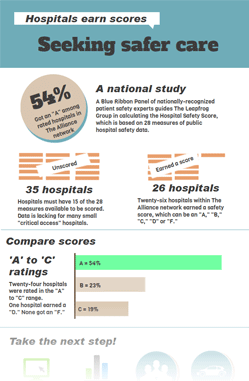
The Leapfrog Hospital Safety Scores – How did your hospital do?
Before you visit your local hospital, you might want to check its Leapfrog Hospital Safety Score.
The Leapfrog Hospital Safety Score, created by a blue ribbon panel of nationally-recognized patient safety experts, is based on 28 measures of publicly available hospital safety data. The panel gives hospitals a grade of A, B, C, D or F based on injuries, infections and errors.
The latest hospital safety score was released in October 2013.

Key Network Hospital Findings
The Alliance is a cooperative of 180 employers who self-fund their health benefits. As part of our mission as “employers moving health care forward,” members of The Alliance often encourage employees and family members to consider quality issues such as patient safety when selecting a health care provider.
Here are some highlights about how hospitals in The Alliance network fared when the latest scores were released in October 2013.
- Out of the 26 hospitals graded, 14 (54%) received an “A,” six (23%) received a “B,” five (19%) received a “C,” and one (3%) received a “D.” No hospitals received an “F.”
- Thirty-seven in-network hospitals do not appear on the list, which means not enough data is available to accurately calculate a score for these hospitals. In most cases, this is because small hospitals with designation as a “critical-access hospital” are not required to submit data to the Centers for Medicare and Medicaid Services (CMS), which is one of the sources of the data used in the Leapfrog scores.
- Both nationally and in The Alliance network, a notable number of hospitals improved their score by two grade levels. Five hospitals moved from a “C” ranking in spring 2013 to an “A” rating in the fall 2013 survey: Beaver Dam Community Hospital Inc., Beaver Dam, Wis.; FHN Memorial Hospital, Freeport, Ill.; Finley Hospital, Dubuque, Iowa; UW Hospital, Madison, Wis.; and UW Health Partners/Watertown Regional Medical Center, Watertown, Wis. In addition, Kishwaukee Community Hospital in DeKalb, Ill., improved two levels from a “D” to a “B.” Nationally, 3.5 percent of hospitals improved by two or more grade levels.
- In the state of Wisconsin, this is the first year that more hospitals received “A” and “B” grades than any other grades. In addition, more hospitals improved than declined, meaning that the largest category within the study is hospitals with “no change” in their grade.
[box]
Learn More About Hospital Safety Scores and Quality Care
- Executive Order on Improving Price and Quality Transparency
- Wisconsin Can Save $394 Million by Steering Patients to High-Value Health Care
- How You Can Steer To Better Value
[/box]








